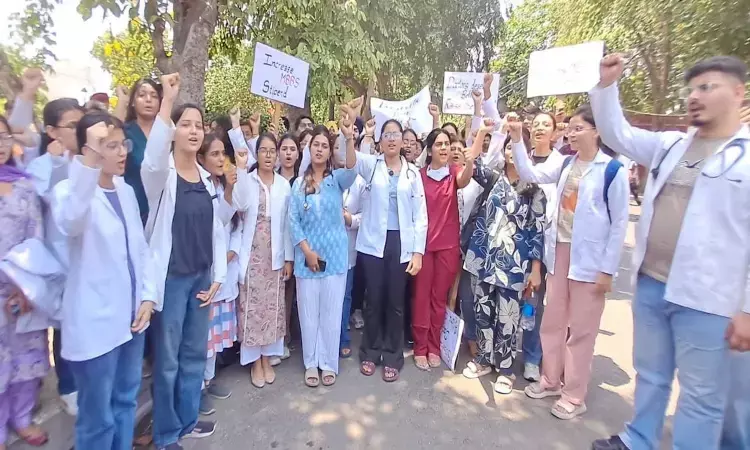
Demand Hike in Stipend, Fee Rationalisation, and Implementation of NPA
Patiala: Interns and resident doctors across Government Medical Colleges (GMCs) in Punjab have launched protests against what they call the unjust combination of soaring educational costs and stagnant stipends. The agitation, which included a rally yesterday, reflects growing unrest among medical professionals who say the current system places an unsustainable financial burden on students from middle- and lower-income families.
Interns Demand Fair Compensation
Interns from the 2020 MBBS batch have highlighted that despite paying ₹7.8 lakh for their education, they are only receiving a monthly stipend of ₹15,000, a rate that has remained unchanged since 2019. The situation is even more dire for students admitted in 2024, who are paying ₹9.5 lakh in course fees.
In a memorandum to the Chief Minister, interns requested that their stipend be raised to ₹31,650 per month, aligning with what is offered in central government medical colleges. They also proposed that, in line with the 5% annual increase in tuition fees, the internship stipend should be adjusted similarly to reflect rising living costs.
Resident Doctors Echo Concerns, Call for Parity
Resident doctors, who currently receive ₹67,978 per month, argue that their stipend is significantly lower than in neighboring states like Haryana, Rajasthan, and Uttar Pradesh. In their communications to college principals and government officials, doctors pointed to Articles 21 and 41 of the Constitution, as well as provisions of the Minimum Wages Act, 1948, and Equal Remuneration Act, 1976, stressing that fair compensation is a matter of legal obligation and dignity.
A letter from RDA Faridkot noted the high workload (80–100 hours/week) faced by residents in critical care environments, urging the government to acknowledge their dedication with proper remuneration. Additional demands include:
- Immediate revision of stipends to match national standards.
- Rationalisation and reduction of tuition and institutional fees.
- Implementation of Non-Practicing Allowance (NPA) for all eligible Punjab Civil Medical Services (PCMS) doctors.
Allegations of Exploitation and Clerical Overload
In a detailed letter to the Director Principal of Rajindra Hospital, RDA Patiala highlighted the burden of non-academic clerical duties like file management and bedhead ticket maintenance. The letter stated:
“Burdening us with clerical work compromises our education and is a form of silent exploitation.”
It also raised concerns over inadequate emergency staffing, alleging that PG residents are forced to manage emergency units without formal authority or support, exacerbating burnout and risk of medical errors.
Doctors also criticized the Standard Operating Procedure (SOP) implementation, stating that the nursing staff refuses to comply, unfairly shifting responsibility onto residents.
Ultimatum to Government: Peaceful Protest Planned
In response to continued inaction, RDA Patiala warned:
“If no substantial steps are taken by May 26, 2025, we will initiate a peaceful gate protest across all major GMCs in Punjab.”
The protest is to be held under Article 19(1)(a) and 19(1)(b) of the Constitution, ensuring lawful demonstration of dissent.
Statements from Leaders
Dr. Milanpreet Thind, Advisor of RDA GMC & RH Patiala, emphasized:
“Fees keep rising, but stipends don’t. We’re only asking for what’s fair — maybe a Dearness Allowance (DA) component with our stipend. We’re trying to avoid a strike to protect patients, but we’ve been ignored for months.”
Dr. Meet Ghonia, Secretary of FORDA, also weighed in:
“A ₹500/day stipend is an insult to intern doctors who pay ₹8 lakh in fees. Other states with much lower fees still offer better stipends — this must change.”
Key Demands:
- Increase internship stipend from ₹15,000 to ₹31,650.
- Raise resident doctor stipend to match other states.
- Rationalise tuition and institutional fees.
- Implement NPA across the board.
- Reduce non-academic clerical workload.
- Fill vacant Emergency Medical Officer posts.
As tensions escalate, the Punjab government now faces pressure to act decisively to address the long-standing grievances of its frontline healthcare workforce — or risk a coordinated, state-wide protest.

